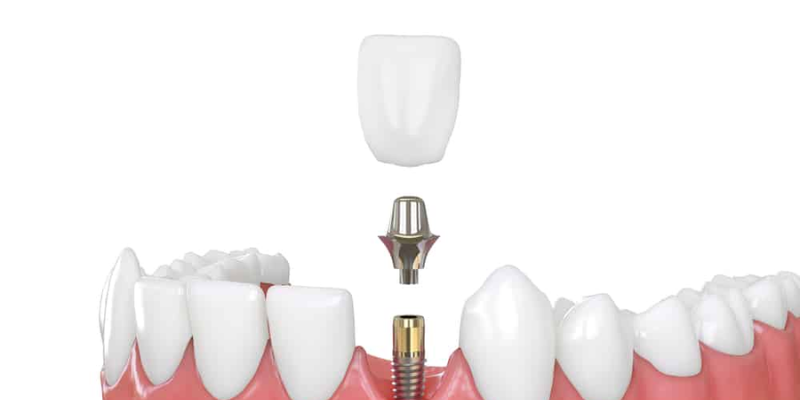Do Dental Implants Hurt?
Dental implant surgery is one of the most effective and long-lasting methods of tooth replacement. However, because this procedure includes implanting an artificial tooth root into the jawbone, it almost invariably results in some discomfort. Many dental patients are concerned about do dental implants hurt and amount of pain they may suffer following the procedure and how long it will continue. It’s helpful to know what happens after a patient receives an implant to get a sense of how uncomfortable the implant process can be. In many circumstances, a bone graft is used to prepare the area after a natural tooth is removed but before an implant is implanted. These grafts help to promote the growth of new bone.
A patient’s dental expert drills a hole into the jawbone during dental implant surgery. The hole is filled with a metal post. This metal post serves as a substitute for a natural tooth root. It’s important to give the post time to osseointegrate or allow the patient’s jaw bone to grow through it. Despite the fact that this procedure can take months, it is necessary for a healthy and durable implant. The abutment, which connects the dental crown to the post, is usually not linked to the post until osseointegration is complete.
Why Do Dental Implants Hurt?
To place the abutment, the dentist may need to perform minor surgery. This is a simple procedure that just affects the gums. It may cause some bleeding and swelling, but the pain from the abutment placement is less severe than the pain from the metal post-placement. Both the gums and the jaw are traumatized during dental implant surgery. Because the mouth will be numbed, the surgery itself should be painless. However, once the numbness goes off, patients may experience some pain.
Many dentists prescribe pain relievers to patients who are experiencing discomfort at the implant site. In some circumstances, post-operative discomfort is moderate enough to be treated with over-the-counter pain relievers. In most cases, a single implant will cause less discomfort than an operation involving many implants. Patients commonly experience pain for up to 10 days after the treatment, however it may go away sooner.
Patients should see a dental practitioner promptly if significant discomfort persists after the 10-day period. Long-term pain could indicate that the implant site is contaminated. If this is the case, the dentist must act swiftly in order to save the implant.
Why Do Patients Prefer Dental Implants?
People frequently believe that the gap left by the loss of a permanent adult tooth will remain vacant. The truth is that an exposed tooth socket is prone to infection, can cause teeth to shift out of position, and can result in a variety of other problems. We can help patients prevent those oral health complications with a dental implant. We have the equipment and expertise to give patients with a dental implant that is tailored to their unique needs.
Dental implants can also aid to maintain face structure by giving the functionality required to perform as well as the original tooth did before it was broken. By combining them with a dental crown, you can ensure that the dental implant blends in seamlessly with your remaining teeth.
We must next allow your gums to heal after the operation is completed. Your gums will begin to build bone around the implants at this point. The healing process can last anywhere from three to eighteen months. We can’t take impressions of your gums and create permanent tooth restorations until your gums have healed after surgery. When those come back from the lab, we’ll be able to finally put them in your mouth, where they’ll hopefully last the rest of your life. Dental implants are generally not the ideal dental treatment for you if you lack patience.
How Do Dental Implants Hurt?
Another thing to think about before getting dental implants is this one significant disadvantage. Despite the fact that dental implants might help you preserve bone mass in your jaw, bone loss surrounding your implants is typical. This is due to natural bone loss over time. If you lose too much bone, your dental implant may need to be replaced. This is why having your dental implants installed by a qualified dentist is crucial. We take our time when arranging your dental implant procedure to ensure that your implant is put in the greatest possible location for long-term success.
The failure of dental implants is a potential for any patient who has them. In most cases, only about ten percent of pupils fail. We only install dental implants in patients in whom we are convinced there will be no implant failure. If you do decide to receive dental implants, make sure you get them from a dentist who is highly experienced and trained to avoid failure.
Disadvantages Of Dental Implants
Although dental implants are designed to last a lifetime, the restorations you connect to them may not. Another disadvantage of dental implants is the possibility of having to repair your restorations in the future, which can be pricey. A single dental crown, for example, can cost up to $1,000. When you have many in your mouth, it can quickly mount up. Dentures and dental bridges are less expensive, but they pile up over time. The majority of patients who require restoration replacement are those who did not properly care for their restorations in the first place.
Dental crowns and bridges are comprised of porcelain, and with proper care, they can endure for the rest of your life. This entails brushing and flossing on a regular basis and avoiding physical injury to your teeth. This entails wearing a night guard and, if necessary, a mouth guard.
Another significant disadvantage of dental implants is that their placement necessitates surgery. You might not think this is a huge deal, but surgery comes with a chance of complications. The complication rate is only about 5% to 10% on average. Infection, damage to neighboring teeth, delayed bone healing, nerve damage, prolonged bleeding, jaw fractures, and other risks and consequences are all possible with dental implants. Dental implants may be ideal for you if you are ready to take these risks.
Do Breast Implants Get Bigger After Surgery or Is There a Problem?
If you have experienced something that has made, you wonder “do breast implants get bigger after surgery?” no, breast implants do not get bigger after surgery. If a patient is experiencing enlargement of their implants, it could be due to several factors, such as capsular contracture, weight gain, or shifting of the implant. It is important to consult a plastic surgeon for an evaluation if you experience any changes in your implants after surgery. Sometimes, a revision procedure may be necessary to correct any issues.

It is also important to note that the implant size will remain the same – they will not get larger over time. During the initial consultation, patients should discuss with their surgeon the expected size of their implants after surgery, and any potential risks associated with implant sizing. It is important to ensure that patients understand the possible outcomes of their procedure before committing to surgery. Finally, it is essential to follow up with your plastic surgeon for regular check-ups after surgery, ask them, “do breast implants get bigger after surgery?” so any issues can be addressed as quickly as possible. This will help ensure that your breast implants remain healthy and safe. If you have any other questions like “how breast implant surgery is performed?” you can contact a health care provider.



